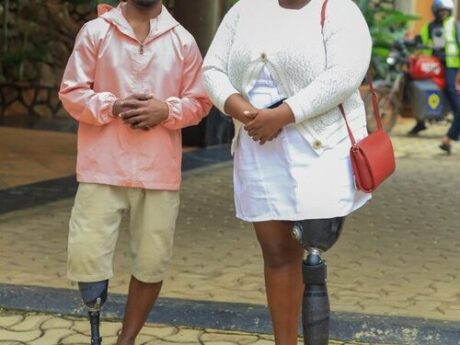
Road accident survivors demand the return of the Express Penalty System (EPS).
By Isaac Senabulya.
The amputees, under their umbrella, The Amputee Self-Help Network Uganda (ASNU), have appealed to the government to enhance policies and regulations that strengthen and support accident survivors, highlighting the need to establish rescue and emergency point areas to save casualties.
ASNU, an organization dedicated to supporting individuals who have experienced physical disabilities due to road accidents, held a press conference to draw urgent attention to road safety in Uganda in response to a recent tragic accident in Kiryandongo, where over 40 people perished in the accident.
The survivors further pointed out the challenges they face, including the prohibitively expensive prosthetics and medical equipment, as well as employment imbalances that leave them incapacitated and excluded from the workforce long after surviving accidents.
These identified root causes of road accidents, with speeding at the forefront, discuss systemic failures and propose solutions, including greater driver discipline, safer road infrastructure, and intelligent automated enforcement to prevent future tragedies.
The recent reports indicate that 14 people die daily, equivalent to a fully loaded taxi lost every day. Rising Annual Death Toll: From 4,159 in 2022 to 5,144 in 2024 – an 80.2% increase since 2014.
1.2 million incidents annually involve motorcycles, and Uganda remains among the top six countries worldwide for road deaths per capita.
They are highlighting massive costs from hospitalization, lost productivity, and long-term societal impact.
“We understand the devastating toll road accidents take on hospitals, families, and entire communities. That’s why we’re calling on everyone – from government to individual road users – to prioritize safety and take immediate action,” Charlotte Kangume ASNU Co-founder, also accident survivor, stated.
They also challenged the government to bring back the Express Penalty System (EPS), which was suspended recently, citing its proven impact in reducing accidents.
Through the network, survivors are urging the government and all road users to support their advocacy for responsible road use, technology-driven enforcement, and enhanced survivor support systems.
“I’m speaking out today to raise awareness about road safety and the importance of leveraging technology like automated penalties for reckless driving to prevent accidents. By embracing innovation, we can reduce the number of accidents on our roads and save countless lives. If automated enforcement tools like EPS were here, more than 40 lives would be saved. We saw its impact when it was operating during June,” she added.
“As a survivor, I know the pain and struggle that come with road accidents. Implementing smart enforcement can help us create a safer environment for all road users. Let’s harness technology to reduce accidents and save lives. I also urge the government to educate drivers, pedestrians, and passengers to speak up against bad driving – because accidents leave families broken and cause permanent damage. We need to reduce the number of accidents on our roads.”– Joseph Asaba, Accident Survivor.
ASNU calls for collective action: invest in emergency response stations, reinstate EPS, subsidize prosthetics, and enforce stricter, tech-enabled traffic discipline – to protect lives and rebuild futures.




